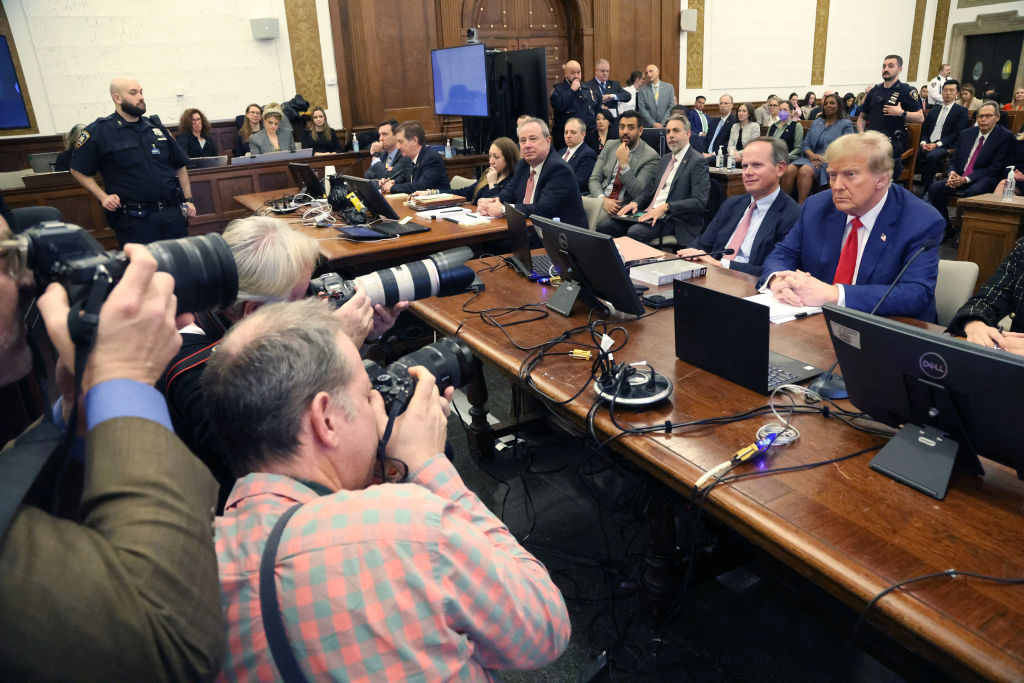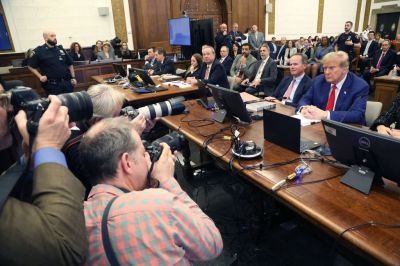Welcome back to The Collision! This week, we’ll get into the politics of Donald Trump’s criminal and civil problems—and how they may actually be working in the Republican frontrunner’s favor—then we’ll take a closer look at the indictment of a key FBI source behind the GOP’s “Biden crime family” allegations.
It’s a long one, so consider the Docket cleared for the week.
Can Trump Capitalize on ‘Democratic Lawfare’?

As the civil and criminal cases have piled up over the past year, Donald Trump has only grown more popular among GOP voters, many of whom see the charges against the Republican frontrunner as just another type of political cudgel wielded by Democrats. “The only way they defeat Trump is through lawfare,” Steve Bannon told listeners of his War Room podcast last year. “[To] all the scumbags over at DOJ—and you are scumbags—the only way that you’re going to stop him from getting back to office and deconstructing the deep state and the administrative state, and holding you accountable for your lawlessness is, you’ve got to use lawfare.”
“Lawfare”—a play on “warfare”—is a term sometimes used by lawyers to mean “the strategic use of legal proceedings to intimidate or hinder an opponent.” In civil litigation, for example, when a large corporation uses its army of lawyers to bury the little guy in motions and document requests just to make his life miserable and expensive? That’s lawfare. Filing a motion the day before Thanksgiving so the opposing team has to work over the holiday? That’s lawfare, too.
But for Trump supporters, “lawfare” has taken on a different meaning in recent years.
Whether it’s New York Attorney General Letitia James, Manhattan District Attorney Alvin Bragg, Fulton County District Attorney Fani Willis, or Biden’s Department of Justice, Trump supporters see elected Democrats using the law to accomplish what they can’t do politically, which is defeat Trump. They are bringing cases they wouldn’t have brought against anyone else, and relying on broad statutes or untested legal theories to do so. These Trump supporters view efforts to remove Trump from the ballot entirely in Colorado and elsewhere as the culmination of this strategy, deploying a novel argument under the 14th Amendment without regard to what it would do to our political system moving forward.
It’s easy to argue that Trump should be held accountable if a prosecutor believes there’s evidence to support a conviction. He’s not above the law just because he is running for president. In fact, plenty of people believe that is why he’s running for president again—to avoid justice.
But Republican voters’ concerns about “lawfare” aren’t entirely unfounded, either. First and foremost, remember the campaigns many of the people currently prosecuting Trump ran. Although he maintained that he didn’t want to “prejudge” any potential case, Bragg launched his bid for the district attorney’s office in 2019 arguing that Trump was “lawless” and that he would “hold him accountable.” Willis launched a new fundraising website just before she indicted Trump in Georgia, and in New York, James promised during her 2018 campaign to pursue the man she described as an “illegitimate president” and an “embarrassment.” President Joe Biden, according to two anonymous sources close to him, has recently expressed frustration to aides that Attorney General Merrick Garland hasn’t moved quickly enough in the Justice Department’s investigation into Trump, increasing the odds a trial doesn’t take place before Election Day. Why would the timing of the trial be relevant to Biden except if he believed it would help him politically?
Second, there are the cases themselves. Not all of them are created equally, as we’ve laid out before. But Bragg’s case, for example, is an obvious effort to get around the statute of limitations using an underlying federal charge that the Department of Justice decided not to bring (despite bringing two other cases) regarding alleged hush-money payments to Stormy Daniels. In one of the federal cases, special counsel Jack Smith charged Trump with corruptly obstructing, influencing, or impeding an official proceeding. That law comes from the Sarbanes-Oxley Act, which was passed in response to the Enron scandal and references “action with respect to a document, record, or other object.” The Supreme Court is going to decide whether that statute can apply to January 6 defendants who stormed the Capitol but had nothing to do with documents or records. Smith’s detractors would argue that he wanted to indict Trump so badly that he found a vague criminal law for a totally unrelated crime just to be able to get in front of a grand jury that he knew would indict Trump on anything it could.
On the recent $350 million New York civil fraud verdict, Jeb Bush, of all people, has argued that the case will damage the legal fabric of the country. Of “the 12 cases brought under [that particular state] law since its adoption in 1956 in which significant penalties were imposed, the case against Mr. Trump was the only instance without an alleged victim or financial loss,” he noted.
Even the strongest of the criminal cases against Trump is starting to look a little shaky. There’s no question he willfully retained national security information at Mar-a-Lago. Trump’s defense has always been that the documents belonged to him and that he was allowed to keep them because he was president when he took them. That argument was laughed at by every major media outlet. But as special counsel Robert Hur laid out in his report on Joe Biden’s retention of classified material, Biden himself made a nearly identical argument. Even more damning, it turns out Ronald Reagan took his notebooks that contained classified material home with him and kept them there until his death. Why is that so relevant? Because the Department of Justice and the National Archives knew about it. Now Trump supporters are left to wonder why the DOJ didn’t seem to mind when Reagan did it, but brought criminal charges against Donald Trump after he announced he was running for president again.
Expect to hear more about “lawfare” from Trump and his surrogates in the coming months. While Democrats see a justice system holding a rogue former president accountable, Republicans see partisan actors bringing flimsy cases in front of friendly juries to see if they can hurt Trump politically. The dynamic certainly bolstered Trump’s primary campaign—just ask Ron DeSantis, whose poll numbers began their steady descent around the same time Bragg’s indictment came down last April. But at this point, the Republican base doesn’t have much bearing on Trump’s chances of reclaiming the White House; the question now is whether swing voters in Pennsylvania and Georgia will see Trump as a criminal or a victim of Democratic lawfare.
Sarah’s View
“Lawfare” is essentially the darker, more nefarious-sounding word for the concept from A Man for All Seasons that I often talked about last year: They are willing to cut down the laws to get to the Devil himself.
It’s important to realize that the people who cut corners always think they are the good guys. In cases where police or prosecutors frame someone, you will universally find that they did it because they thought the person was guilty, and they believed they were protecting the public against a bad guy. It’s an “ends justify the means” thinking that is anathema to our rule of law and especially to our criminal justice system.
The Alexander Smirnov Indictment and What It Means for the Bidens
We touched on it in the Docket last week, but let’s dig a little more into the Justice Department’s indictment of Alexander Smirnov, the Israeli-American source for the FBI who, prosecutors allege, spun a bunch of lies about Hunter Biden and Joe Biden—perhaps with the influence of Russian intelligence.
The indictment, brought by special counsel David Weiss, identifies Smirnov as a resident of Los Angeles and a “confidential human source” who regularly worked on investigations with an FBI “handler.” The handler told Smirnov on multiple occasions since he first began working with the FBI in 2010 that his information would be used in criminal investigations. The indictment also lists 20 specific dates between 2010 and 2023 on which the handler “admonished” Smirnov to be truthful when speaking with the FBI.
Despite all this, the indictment goes on to say, in 2020 Smirnov provided “false derogatory information” about a former elected official in the Obama administration and his son—“Public Official 1” and “the son of Public Official 1” throughout the indictment, but clearly a reference to Joe and Hunter Biden.
Here’s the story Smirnov told the FBI in 2020: While meeting with officials from Burisma Holdings, a Ukrainian energy company, in 2015 and/or 2016, these officials supposedly told Smirnov that Hunter Biden had been hired to sit on the company’s board so that his father, then the sitting vice president, could put pressure on Ukraine’s top prosecutor, Viktor Shokin. This would be a boon for Burisma, which at the time was under investigation by Shokin’s office. Smirnov even claimed that these officials told him both Hunter and Joe Biden had each been paid $5 million so that Hunter “will take care of all those issues through his dad.”
If this story sounds familiar, it’s because it’s served as the basis of both the “Biden Crime Family” narrative some conservative media outlets have been pushing for years and the House GOP-led impeachment inquiry into President Biden that has inched along for months but with dubious signs of progress. And the feds now say that Smirnov made it all up.
The story’s timeline and Smirnov’s telling of it are important to understand. Some key background: The corrupt and scandal-ridden Shokin was ousted by the Ukrainian parliament in 2016 after other nations and international organizations, including Biden and the Obama administration, urged Ukraine to get rid of him and reform the prosecutor general office. While opposing corruption was a well-documented part of the Obama administration’s Ukraine policy, by 2018 the idea that Biden had personally pushed for Shokin’s ouster to benefit his son’s business interests at Burisma—or even to protect Hunter himself from a corruption probe in Ukraine—had been injected into the mainstream by Rudy Giuliani, the former New York City mayor and close ally of Donald Trump. Although Giuliani’s claims were light on facts and evidence, they were explosive and a useful attack in the run-up to Biden’s expected presidential bid. The story also led to the infamous July 2019 phone call between Trump and Volodymyr Zelensky, then the president-elect of Ukraine, that would ultimately trigger Trump’s first impeachment.
But Smirnov’s indictment alleges—using email and text exchanges—that he didn’t speak with anyone from Burisma before 2017, when he began providing the FBI with information about the company’s interest in purchasing an American energy company. Not only is that after Smirnov claimed to have heard those remarks about Burisma using the Biden connection to oust Shokin, it’s also after Shokin was forced out of office and Biden had left the vice presidency. Furthermore, the indictment claims, Smirnov didn’t provide information related to the Bidens and Burisma until 2020, three years after he first began talking with the FBI about Burisma and after Giuliani’s claims became a well-known news story.
Other details in Smirnov’s story don’t stand up to scrutiny, federal prosecutors say. The indictment lays out evidence that one of Smirnov’s business associates could not have been at a meeting with Burisma officials, as Smirnov had initially claimed, nor had this person traveled to Ukraine to meet with Burisma officials alongside Smirnov when Smirnov claimed. The indictment refutes Smirnov’s claim that he and another business associate had a pre-2017 business meeting with a specific Burisma official. That business associate actually “never met or spoken with” that Burisma official (emphasis in the original).
By the time Smirnov was telling his story to the FBI, Republicans and many in conservative media were already suggesting the existence of some kind of corrupt agreement between Burisma and the Bidens. The indictment provides evidence—text message exchanges with his FBI handler—that Smirnov expressed a “bias” against Biden, now a presidential candidate, and he seems to have delivered a false story that confirmed what Giuliani and others had been suggesting.
In short, the indictment claims that when the FBI questioned him about his story again in 2023, Smirnov changed parts of it and even spun up a new “false narrative” about Hunter Biden that he sourced to “Russian officials.” All of this seems to have made it clear to the feds that Smirnov was lying.
The Blow to the GOP’s Impeachment Argument
What makes Smirnov’s alleged tall tale so consequential is how foundational his claims were to the Republican narrative about Hunter Biden’s business dealings and Joe Biden’s supposed involvement in them.
Last summer, Sen. Chuck Grassley of Iowa and Rep. James Comer of Kentucky jointly released an official FBI form that contained claims from an individual we now know to be Smirnov. The two Republican lawmakers obtained the form by way of a whistleblower and, according to Grassley, it described “an alleged criminal scheme involving then-Vice President Joe Biden and a Ukrainian business executive.” (The particular form in question, called an FD-1023, is used to record raw, unverified information provided by confidential sources.)
Within two months, then-House Speaker Kevin McCarthy announced a formal impeachment inquiry amid pressure from the right-wing faction of the House GOP. While Comer, the chairman of the House Oversight Committee, and the other relevant committees have investigated other areas of Hunter Biden’s business dealings to seek evidence of influence peddling, the Burisma allegations formed the core of their probe.
Last July, Rep. Jason Smith, the chairman of the House Ways and Means Committee, called the FBI form revealed by Grassley and Comer a “smoking gun.” And Rep. Jim Jordan, the chairman of the House Judiciary Committee, told reporters in December the Burisma allegations were the “key thing” to impeachment. “When you get to Burisma, you get to the White House,” said Jordan during a December appearance on Fox News. He has also described the FD-1023 form—from a “highly credible, confidential human source”—as “the most corroborating evidence we have.”
Now, Republicans are forging ahead despite evidence that Smirnov’s claims were fabrications. “At the end of the day, he wasn’t an important part of this investigation,” claimed Comer in an interview this week on Newsmax. And Jordan, when confronted Wednesday by CNN, said the indictment of Smirnov “doesn’t change the four fundamental facts” driving their investigation: that Hunter Biden was on Burisma’s board; that he was “unqualified” to sit on the board; that, after Burisma executives asked Hunter to get help from Washington, D.C., regarding Shokin’s investigation, Hunter called his father, the sitting vice president, according to testimony from former Hunter Biden associate Devon Archer; and that Joe Biden publicly pushed for Shokin’s removal by holding up American taxpayer-funded aid to Ukraine contingent on reforms to the prosecutor general’s office. Jordan insisted that even with the “most corroborating evidence”—a supposed pay-to-play agreement between Burisma and the Bidens—falling apart, those four facts still stand.
But for an inquiry that already seemed to be languishing with continued hearings but no actual articles of impeachment seemingly on the horizon, the Smirnov indictment is a serious blow. That won’t stop Republicans from making the case against Hunter Biden’s nefarious international business dealings—and they’ve got plenty of solid evidence on that front—but it further diminishes the argument that the president himself had some kind of direct involvement, even if he may have been at least somewhat aware of what Hunter was up to.
One More Thing
By the way, the feds rearrested Smirnov on Thursday while he met with his lawyers in Las Vegas. Weiss and his team filed a motion earlier in the week arguing for his continued detention on grounds that he’s a flight risk, but were denied by a Nevada judge. Following his arrest on a warrant from a federal judge in California, where Smirnov will be tried, his lawyers immediately filed to have Smirnov, who has dual Israeli and U.S. citizenship, released again.







Please note that we at The Dispatch hold ourselves, our work, and our commenters to a higher standard than other places on the internet. We welcome comments that foster genuine debate or discussion—including comments critical of us or our work—but responses that include ad hominem attacks on fellow Dispatch members or are intended to stoke fear and anger may be moderated.
With your membership, you only have the ability to comment on The Morning Dispatch articles. Consider upgrading to join the conversation everywhere.